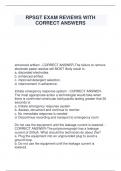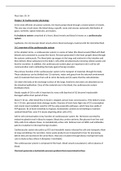Practice exam
Clinical Psychology
135 multiple-choice questions & 20 open-ended questions
, Multiple-choice questions
Week 1
1. Which of the following best describes the distinction between illness and disease?
A. Illness is only determined by objective clinical findings, while disease includes subjective
experiences from the patient.
B. Disease is the subjective interpretation of symptoms, whereas illness refers to objective
pathological processes.
C. Illness refers to the patient's subjective experience of symptoms, while disease involves
the clinician's objective assessment of pathology.
D. Disease and illness are interchangeable terms describing the same medical condition.
2. Which scenario is the best example of holism in patient care?
A. The clinician focuses only on treating physical symptoms without considering the
patient's emotional state.
B. The clinician explains the illness to the patient but ignores the patient's understanding or
emotional needs.
C. The clinician prescribes medication without discussing potential side effects or
alternative treatments with the patient.
D. The clinician and patient have empathy and understanding for each other's conditions,
working together towards improvement.
3. What distinguishes data from phenomena in scientific research?
A. Data are subjective interpretations, while phenomena are objective observations.
B. Data are raw observations, while phenomena are stable features consistently observed.
C. Phenomena are hypothetical constructs, while data are based on evidence.
D. Phenomena are derived directly from theories, while data support theoretical constructs.
4. In the context of patient response to medication, what is a theory?
A. Patient testimonials and other evidence.
B. The raw data collected from clinical trials.
C. A detailed explanation of observed phenomena.
D. Hypotheses yet to be tested in experimental settings.
5. Which aspect of the Mental State Exam (MSE) involves observing a person's non-verbal
cues, such as posture, grooming, and facial expressions?
A. Behavior
B. Speech
C. Orientation
D. Memory and Concentration
1
, Week 2
6. Why are substance use disorders particularly stigmatized?
A. They are widely recognized as treatable brain disorders.
B. Society perceives them as character flaws rather than medical conditions.
C. They have minimal impact on individuals' lives.
D. They are easy to manage without professional help.
7. What is the suggested replacement for the term "schizophrenic" to promote person-
centered language?
A. Individual suffering from schizophrenia
B. Schizophrenic person
C. Schizophrenia-afflicted individual
D. Person with schizophrenia
8. Which approach in understanding illness is more commonly utilized in science and
statistics, looking at patterns across populations?
A. Nomothetic
B. Idiographic
C. Personalized
D. Group-oriented
9. If researchers want to understand the diverse factors contributing to the development
and progression of anorexia nervosa (AN) in different individuals, which approach would
be most appropriate?
A. Nomothetic
B. Idiographic
C. Personalized
D. Group-oriented
10. Which scenario best illustrates the concept of severity in clinical psychology?
A. A problem with high prevalence rates but mild consequences.
B. A problem with low prevalence rates but severe consequences.
C. A problem with high prevalence rates and severe consequences.
D. A problem with low prevalence rates and mild consequences.
11. What percentage of individuals experience a disorder before the age of 18?
A. 20%
B. 35%
2
Clinical Psychology
135 multiple-choice questions & 20 open-ended questions
, Multiple-choice questions
Week 1
1. Which of the following best describes the distinction between illness and disease?
A. Illness is only determined by objective clinical findings, while disease includes subjective
experiences from the patient.
B. Disease is the subjective interpretation of symptoms, whereas illness refers to objective
pathological processes.
C. Illness refers to the patient's subjective experience of symptoms, while disease involves
the clinician's objective assessment of pathology.
D. Disease and illness are interchangeable terms describing the same medical condition.
2. Which scenario is the best example of holism in patient care?
A. The clinician focuses only on treating physical symptoms without considering the
patient's emotional state.
B. The clinician explains the illness to the patient but ignores the patient's understanding or
emotional needs.
C. The clinician prescribes medication without discussing potential side effects or
alternative treatments with the patient.
D. The clinician and patient have empathy and understanding for each other's conditions,
working together towards improvement.
3. What distinguishes data from phenomena in scientific research?
A. Data are subjective interpretations, while phenomena are objective observations.
B. Data are raw observations, while phenomena are stable features consistently observed.
C. Phenomena are hypothetical constructs, while data are based on evidence.
D. Phenomena are derived directly from theories, while data support theoretical constructs.
4. In the context of patient response to medication, what is a theory?
A. Patient testimonials and other evidence.
B. The raw data collected from clinical trials.
C. A detailed explanation of observed phenomena.
D. Hypotheses yet to be tested in experimental settings.
5. Which aspect of the Mental State Exam (MSE) involves observing a person's non-verbal
cues, such as posture, grooming, and facial expressions?
A. Behavior
B. Speech
C. Orientation
D. Memory and Concentration
1
, Week 2
6. Why are substance use disorders particularly stigmatized?
A. They are widely recognized as treatable brain disorders.
B. Society perceives them as character flaws rather than medical conditions.
C. They have minimal impact on individuals' lives.
D. They are easy to manage without professional help.
7. What is the suggested replacement for the term "schizophrenic" to promote person-
centered language?
A. Individual suffering from schizophrenia
B. Schizophrenic person
C. Schizophrenia-afflicted individual
D. Person with schizophrenia
8. Which approach in understanding illness is more commonly utilized in science and
statistics, looking at patterns across populations?
A. Nomothetic
B. Idiographic
C. Personalized
D. Group-oriented
9. If researchers want to understand the diverse factors contributing to the development
and progression of anorexia nervosa (AN) in different individuals, which approach would
be most appropriate?
A. Nomothetic
B. Idiographic
C. Personalized
D. Group-oriented
10. Which scenario best illustrates the concept of severity in clinical psychology?
A. A problem with high prevalence rates but mild consequences.
B. A problem with low prevalence rates but severe consequences.
C. A problem with high prevalence rates and severe consequences.
D. A problem with low prevalence rates and mild consequences.
11. What percentage of individuals experience a disorder before the age of 18?
A. 20%
B. 35%
2



